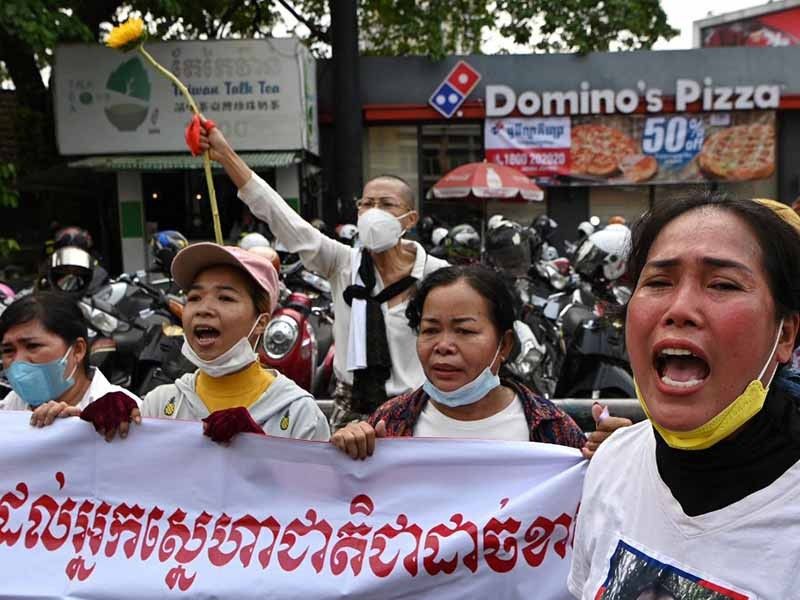Transparency International: Governments in Asia Pacific restricting civic space

MANILA, Philippines (Updated 5:31 p.m.) — Countries in the Asia Pacific region, including the Philippines, have continued the restriction of civic space that began during the worst of the COVID-19 pandemic, according to anti-corruption network Transparency International.
Transparency International publishes the Corruption Perceptions Index, where the Philippines has a score of 33/100 — unchanged since the 2021 index.
Countries on the index can get a score of from 0 (highly corrupt) to 100 (very clean). The scores are based on surveys and assessments by institutions like the World Bank and the World Economic Forum.
Top scorers in the region are New Zealand (87/100), Singapore (83/100) and Hong Kong (76/100).
Aghanistan (24/100), Cambodia (24/100), Myanmar (23/100) and North Korea (17/100) trailed neighbors in the Asia Pacific.
In its summary of the region, Transparency International noted that while some countries have made progress, "grand corruption remains common, and the overall situation has barely improved."
It also reported a disturbing trend: "[A]cross Asia Pacific, states maintain restrictions on civic space and basic freedoms imposed during the pandemic, as leaders continue down the path toward authoritarianism."
RELATED: No improvement in Philippines' score on Corruption Perceptions Index
Government consolidating power, silencing dissent
Transparency International noted that democracy has been declining in the region, especially in the most populous countries.
"Regimes are consolidating power by curtailing space for dissent with more draconian laws that restrict free speech or criticisms of the government – and face no accountability for jailing those who allegedly defy them."
The anti-corruption network pointed out that protests in India in 2011 led to anti-corruption efforts in government. Since then, the government has been consolidating government power and limiting how the public can react to that with "more and more severe restrictions... blocking peaceful protest."
India's government has detained human rights defenders and journalists under the Unlawful Activities Prevention Act and "even more disturbingly, the government has been bulldozing the homes of activists in Muslim communities."
RELATED: Top Indian university bans screening of BBC series on PM Modi
Bangladesh and Cambodia have similar law used against citizens exercising their freedom of speech or expressing dissent.
"Journalists and human rights defenders have been particularly at risk, with governments attempting to intimidate any critics. With forthcoming elections for both in 2023, governments must reverse these trends and ensure the people can make their voices heard," it also said.
Mentioned in the summary as among the countries where democracy has been declining, the Philippines has also seen the use of red-tagging and terrorist labeling against human rights defenders, activists and journalists.
The Anti-Terrorism Council has recently designated community doctor Natividad "Naty" Castro a terrorist for alleged support for and membership in the communist armed struggle.
On Monday, the day that the Transparency International summary was posted, police arrested Jennifer Awingan of the Cordillera Peoples Alliance in Baguio City for rebellion. According to alternative news site Bulatlat, the warrant for Awingan's arrest includes Cordillera activists Windel Bolinget and Steve Tauli and other development workers and organizers in the Cordillera region.
Bulatlat has itself been accused by the government of links to the armed struggle, an allegation that led to the National Telecommunications Commission ordering Internet Service Providers in the country to block access to its site.
Bulatlat has questioned the NTC's order in court and has secured a restraining order against it until the issue is resolved.
"Governments must open up space to include the public in decision-making – from activists and business owners to marginalized communities and young people," Daniel Eriksson, Transparency International CEO, said in a parallel release.
"In democratic societies, the people can raise their voices to help root out corruption and demand a safer world for us all."
RELATED: Karapatan flags similarities in South Korea union raids and local red-tagging
2023 presents opportunities
"Despite the difficulties facing the region, there are many opportunities in 2023 for governments to recommit to fighting corruption," Transparency International said.
"Elections in Bangladesh, Pakistan, Thailand, Cambodia, Myanmar and more can be important moments for the people to make their voices heard and to address corruption concerns that weigh so heavily on many," it also said.
The anti-corruption network also noted that Indial will be leading the G20 in 2023.
"This could be a moment for the region to get a handle on deep-seated grand corruption and harness the full potential for economic cooperation and growth – that will benefit all its people." — Jonathan de Santos
- Latest
- Trending






























